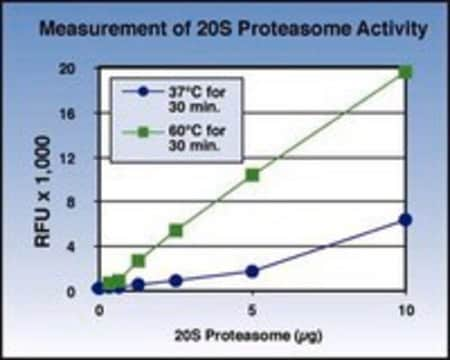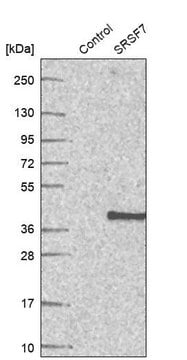ABS192
Anti-phospho-SRPK2 (Ser497) Antibody
from rabbit, purified by affinity chromatography
Sinónimos:
SRSF protein kinase 2, SFRS protein kinase 2, Serine/arginine-rich protein-specific kinase 2, SR-protein-specific kinase 2, SRSF protein kinase 2 N-terminal, SRSF protein kinase 2 C-terminal
About This Item
Productos recomendados
biological source
rabbit
Quality Level
antibody form
affinity isolated antibody
antibody product type
primary antibodies
clone
polyclonal
purified by
affinity chromatography
species reactivity
hamster, mouse, human
species reactivity (predicted by homology)
rat (based on 100% sequence homology), Xenopus (based on 100% sequence homology)
technique(s)
western blot: suitable
NCBI accession no.
UniProt accession no.
shipped in
wet ice
target post-translational modification
phosphorylation (pSer497)
Gene Information
human ... SRPK2(6733)
General description
Specificity
Immunogen
Application
Signaling
Developmental Signaling
Quality
Western Blotting Analysis: A 1:500 dilution of this antibody detected SRPK2 (Ser497) in 10 µg of NIH3T3 cell lysate and Insulin treated NIH3T3 cell lysate.
Target description
Physical form
Storage and Stability
Analysis Note
NIH3T3 cell lysate and Insulin treated NIH3T3 cell lysate
Disclaimer
Not finding the right product?
Try our Herramienta de selección de productos.
Storage Class
12 - Non Combustible Liquids
wgk_germany
WGK 1
flash_point_f
Not applicable
flash_point_c
Not applicable
Certificados de análisis (COA)
Busque Certificados de análisis (COA) introduciendo el número de lote del producto. Los números de lote se encuentran en la etiqueta del producto después de las palabras «Lot» o «Batch»
¿Ya tiene este producto?
Encuentre la documentación para los productos que ha comprado recientemente en la Biblioteca de documentos.
Nuestro equipo de científicos tiene experiencia en todas las áreas de investigación: Ciencias de la vida, Ciencia de los materiales, Síntesis química, Cromatografía, Analítica y muchas otras.
Póngase en contacto con el Servicio técnico







